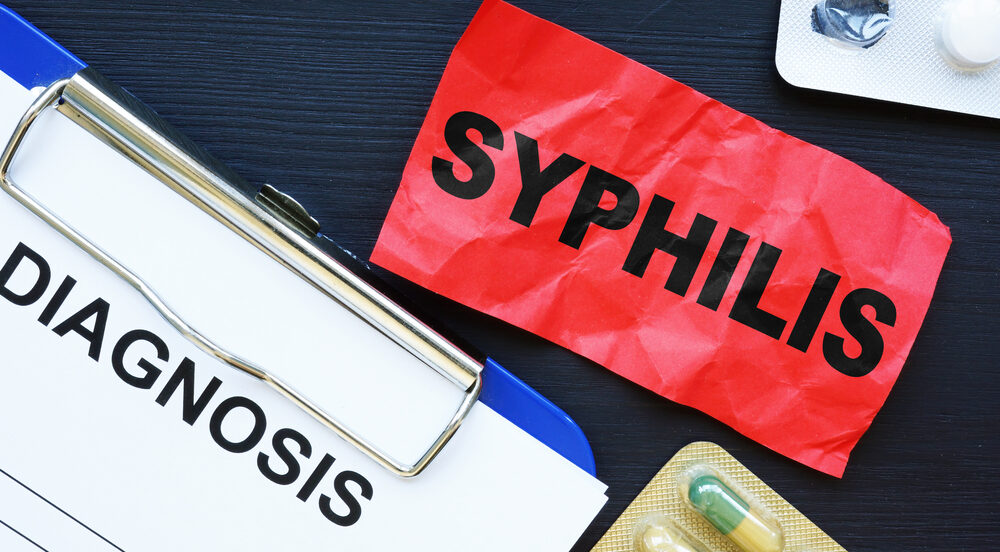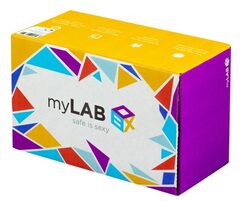Syphilis Infection

Syphilis Symptoms, Stages, Testing & Treatment
By STD Concern
Syphilis is a treatable but highly contagious sexually transmitted disease or STD. The bacteria Treponema Pallidum causes this disease, which occurs in several phases.
The 4 Stages of Syphilis for Men & Women:
- Primary
- Secondary
- Latent
- Tertiary
1. Primary
During the earliest phase of syphilis, the infection begins with the development of sores in 10 to 90 days after exposure. Syphilis sores generally begin as;
- Small, round spots that are firm and painless but can also turn wet and open.
- They look like tiny ulcers and can occur anywhere on the genitals or mouth.
2. Secondary
During the secondary stage, a red rash typically develops on the soles of the feet or palms of the hands. Other rashes can occur elsewhere on the body. They usually look different than the rashes occurring on the hands or feet. The secondary stage occurs between 6 to 36 weeks after exposure and can last 1 to 3 months.
Other symptoms that may develop include:
- Swollen lymph nodes
- White patches in the mouth
- Fever
- Warts in the groin area
- Weight loss
Not Your Symptoms Click Here >>
Testing
Note: You can avoid Health Problems if your STI is Detected & Treated.
3. Latent
Latent syphilis is the term used to describe the disease when it remains Non-Symptomatic. The duration varies from one patient to another.
4. Tertiary
In the final stages (tertiary), syphilis causes Serious Medical Issues. These problems include:
- Blindness
- Deafness
- Dementia
- Arthritis
- Heart damage
- Brain damage
- Paralysis
- Death
Transmission
Syphilis is primarily spread through unprotected sexual activity, including vaginal, anal, or oral sex. Infection can occur during prolonged body contact and/or kissing if sores are present. Syphilis does not occur during casual contact.
It is not transmitted by contact with
- Door knobs
- Toilet seats
- Clothing
- Utensils
- Bath tubs
- Hot tubs
- or Swimming pools
Congenital syphilis occurs when an infected mother passes the disease on to her newborn. When this occurs, the baby often develops abnormalities and sometimes the infant dies.
Transmission Rates
The CDC has some startling details regarding the transmission rates of syphilis. New cases fell dramatically by the year 2000 after a steady decline. Unfortunately, the incidence of new cases doubled from 2005 and 2013, reaching new highs in 2017 when the total number of reported cases rose to 30,644 for of primary and secondary syphilis and 101,567 for all stages.
In 2017, men having sex with men made up the largest group of primary and secondary syphilis at 52% of all cases. Women accounted for only 15% of all cases within the same category.
Syphilis Treatments
Untreated syphilis can lead to serious, life-threatening complications. When treated properly, Syphilis is entirely curable in the early stages. While this STD can be treated, it is important to note that all of the damage caused by the infection is unaffected. The antibiotic "penicillin" successfully treats this STD and has done so since the late 1940's.
Even though syphilis sores clear up on their own after six weeks, the disease remains present in the body. If left untreated, new symptoms usually appear. Typically, symptoms occurring during the secondary stage also clear up on their own.
Nonetheless, the infection remains present, and treatment is necessary to prevent the tertiary stage from taking place.
Is Syphilis Curable?
Yes, with the Right Treatment but might not undo the damage caused by Syphilis if you waited too long to get treated. (CDC)
Conclusion
To avoid being infected practice safe sex which includes using condoms and not engaging in sex with an infected person. If you have any of these symptoms you should be tested ASAP (as soon as possible) and sexual partners be contacted.
Last Updated: Mar 4, 2024
Resources
Syphilis - CDC Fact Sheet – Retrieved July 20, 2018
Note: To receive Proper Treatment for STIs, testing is required.
About STD Symptoms
Some people can be Symptomless (No Symptoms) of infection for Days, Months & even Years. Making it difficult to know if you have an STD without Getting Tested.
STDs do have Similar Symptoms so it might be difficult to tell which Individual STD you have Contracted. That is why a Panel Test for Multiple STDs is Recommended.
5 Complications of Untreated STIs
- Infertility
- Pregnancy Complications
- Increased Risk of Cancer
- Infection with HIV
See All >>
Related Articles
Could Your Symptoms Signal an STI
Four Simple Ways to Prevent a Cold Sore
See All >>
Products
Featured
Best at-Home STD Test Kit
Test for 8 Common STDs
- Chlamydia | Gonorrhea
- Herpes | Syphilis
- Trichomoniasis
- HIV 1 & HIV 2
- Hepatitis C
No Doctor or Lab Visit
Get Treated if Needed
Order Now >>
 Disclaimer: Articles not intended to Diagnose, Treat, Cure or Prevent Diseases.
Disclaimer: Articles not intended to Diagnose, Treat, Cure or Prevent Diseases.
Infections | Education | Products | Testing


